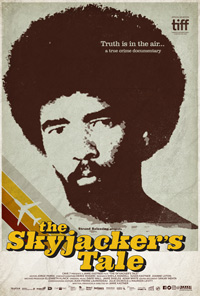Victim or Villain? Kastner’s Paradoxical Docu Goes Far, Not Nearly Far Enough

Coming across as a sort of hybrid between what one might find on the History Channel and a true crime serial, Jamie Kastner indicts the system that condemned Ishmail Muslim Ali with The Skyjacker’s Tale — an attention grabbing docu that oozes with dramatic vibrancy and intrigue. Forgoing the conceptually fruitless exposé that was The Secret Disco Revolution (2012) for a political conspiracy slanted docu, Kastner’s investigative style might be a bit less tedious than his previous effort and is best defined as sleek and stylish.
From the onset, we get a clear sense why the film’s focal character might be posited as an antihero. Ali, who is currently wanted by the FBI, lives with his wife and child in an undisclosed location in Cuba. On December 31, 1984, Ali hijacked American Airlines Flight 626 en route from St. Croix in the Virgin Islands to Queens, New York. From there he was transferred to a prison in mainland United States, serving eight life sentences for the 1972 St. Croix Fountain Valley Massacre and that is until the film’s primary reason for being.
Kastner unravels a backstory that sees Ali’s upbringing, enlistment in the Vietnam War, his involvement with the Black Panthers, and then the docu spends the majority of its brisk one-hour-fifteen-minute runtime time dissecting the Fountain Valley Massacre and the trial that succeeded it. An outwardly clean case of a country club robbery by possible radicals is molded by Kastner into a case of political scapegoating which confronts more the racial history and intolerance of the Virgin Islands.
Kastner and editor Jorge Parra confection a film that that is not dissimilar to how one might compose music. Dramatizations, stock and news footage, and trial drawings add context under a guise that is intriguingly rhythmic and interweaved in a present day story arc which creates a contemporary nuanced tale that is more palpable. Interview set-ups are all well lit and filmed for a more drama effect via dp Derek Rogers (Cube, Camp X) though it becomes somewhat ostentatious for its overuse, and becomes somewhat tongue-in-cheek with the hammy zooms and abrupt music stingers.
While we get a stronger sense of the filmmaker’s intent during the course of the docu’s runtime, Kastner does stamp Ali’s story with a cleverly ambiguous approach and thus this is less a “skyjacker’s tale” and more a historical document of race relations in the Virgin Islands, spotlighting the corruption of the localized system. Much of the interviews don’t add up — contradictory information and dissenting voices aren’t given much space — and as The Skyjacker’s Tale concludes, clearly indicating a prevalent bias from the filmmakers too focused on providing a context that catalogues the events.
★★★/☆☆☆☆☆


